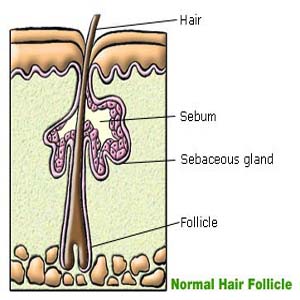
A sebaceous gland that produces oil is a small gland located in the hair of mammals. The sebaceous glands are found under the epidermis of the eyelids and in various other areas of the skin. The glands secrete a fine waxy substance, sebum, from the hair shafts into the hair follicle and therefore onto the skin’s surface. The glands are mainly found on the head, neck, and arms, but they are also found on the face and other parts of the body. When the gland secretes too much sebum on the surface of the skin, a condition known as seborrheic dermatitis occurs. Human sebaceous glands are found on different parts of the face, back, abdomen and arms, as well as on the feet, knees and elbows.
The sebaceous glands secrete an oily substance that helps protect the hair follicle and keep it moist. The gland secretes sebum, which is rich not only in proteins, but also in amino acids. When the gland secretes too much sebum on the surface of the skin, the hair becomes dry and scales can form. Certain bacteria live on the skin that help break down excess sebum, but if the oil content is too high, these bacteria can cause infections.
Because people have sweat glands to produce sweat, excessive sebum production causes excessive sweating. It is very important for the skin to maintain moisture because it promotes healing and hydration.
The sebaceous glands produce oil for many functions, such as preventing sunburn and keeping the skin moist. Sebum is produced during normal growth and then secreted. Sebum deficiency leads to dryness, inflammation, itching, and other problems such as premature aging, acne, eczema, and psoriasis.
The sebaceous glands produce too much sebum if you don’t sweat properly or your skin is exposed to too much heat. If this condition is left untreated, sebum production will increase and your skin will become dry.
The sebaceous glands secrete sebum to protect the skin from harmful bacteria, dirt, and foreign elements. It acts as a effective natural sunscreen
protecting the skin from free radical damage and protecting the outer layer from the sun.
The sebaceous glands produce sebum to stop the hair growth cycle. With dry, damaged and dead skin, hair shafts will not grow and hair strands will not fall out.

If the sebum is not secreted enough, the hair will become dry, brittle and break easily. Thus, if your skin is oily, you will have less hair growth. On the other hand, if your skin is dry and thin, the sebaceous glands will be less active and help keep your hair healthy.
The sebaceous glands are located deep under the skin and are responsible for the production of sebum. The sebaceous glands secrete sebum to protect the skin from the external environment and also to maintain skin moisture.
Since the sebaceous glands are below the surface of the skin, sebum cannot be removed or washed off. However, regular cleansing will help control sebum and prevent dry skin.
To prevent excessive sebum production, you can try applying creams, gels, or shampoos that contain salicylic acid. so that the sebaceous glands do not produce excess oil.
There are many skin care products available to help you control sebum production and keep your skin hydrated and hydrated. These skin care products will also help prevent dryness, inflammation, and excessive hair loss. Plus, you will have healthier skin and better health.
The sebaceous glands are responsible for the production and secretion of sebum, which keeps the skin hydrated. When this process slows down, the skin loses its ability to retain moisture. The sebaceous glands will then begin to produce more sebum to replenish the moisture loss. This is why people with eczema have more sebum in their skin than those who don’t.
Sebum is 70% natural skin substance. Therefore, if you want to avoid drying out your skin, make sure it is well hydrated and the sebum level remains constant.
To keep sebum production from lagging behind, you must also eat a diet rich in nutrients such as protein, minerals, and vitamin A. to help the sebaceous glands function properly. It is important to avoid excessive consumption of sugar, sodium, and caffeine, as these foods can suppress sebum production.